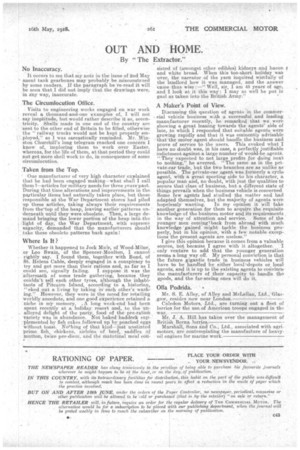OUT AND HOME.
Page 19

If you've noticed an error in this article please click here to report it so we can fix it.
By "The Extractor."
No Inaccuracy.
It occurs to me that my note in the issue of 2nd May anent tank gearboxes may probably be misconstrued by some readers. If the paragraph be-re-read it will be seen that I did not imply that the drawings were, in any way, inaccurate.
The Circumlocution Office.
Visits to engineering works engaged on war work reveal a thousand-and-one examples of. I will not say ineptitude, but would rather describe itas, eccentricity. Shells made in one end of the country are sent to thea other end of Britain to be filled, otherwise the "railway trucks would not be kept properly employed,'! as I was sarcastically reminded. Mr. Winston Churchill's long telegram reached one concern I know of, imploring them to work over Easter. whereas, for the life of them, at that period they could not get more shell work to do, in consequence of some circumlocution.
Taken from the Top.
' One manufacturer of very high character explained that he had been engaged making—what shall I call them ?—artieles for military needs for three years past. During that time alterations and improvements in the puticular items had naturally taken place, but those responsible at the War Department stores had piled up these articles, taking always 'their requirements from the-top of the heap, leaving earlier patterns underneath until they were obsolete. Then, a large demand bringing the lower portion of the heap int6,the light of day, the War Department, with supreme sagacity, demanded that the manufacturers should ',take these obsolete patterns back again?
Where Is It?
Whether it happened to Jack Muir, of Wood-Milne, or Leo Swain, of the Spencer-Moulton, I cannot
. rightly say. 1 found them, together with Bond, of St. Helens Cable, deeply engaged in a conspiracy to try and get more than their rations and as far as I
could see, signally failing. I suppose it was the aftermath of some trade gathering, because they couldn't sell each other tyres, although the inhabitants of Pitcairn Island, according to a, historian, "eked mit a living by taking in each other's. washing." However, they were in the mood for retailing worldly anecdote, ana one good eiperience retained a
niche in my memory. long week-end had been spent recently at a holiday resort and, to the uri
. alloyed delight of the party, food, of the pie-ration . variety was in abundance. Not baked haddock suP-Plernented by fish cakes followed up by poached eggs without toast. No4hing of that kind---just; unstinted prime fish, chickens, sirloins of beef, saddles of
mutton, twice per-diem. and the Matatinal meal can..
sisted of (amongst other edibles) kidneys and bacon and white bread. When this too-short holiday was over, the narrator of the yarn inquired wistfully of the landlord how it was managed, and the answer came thus wise Well, sir, 1 am 45 years of age, and I look at it this way: I may as well be put in gaol as taken into the Bntish Army?'
A Maker's Point of View.
Discussing th.e question of agents in the coramer. cial vehicle business with a successful and leading manufacturer recently, he remarked that we were showing a great leaning towards the agents' side of late, to which I responded that suitable agents were growing rapidly and that it was eminently advisable that the motor agent should handle the business and prove of service to the users. This evoked what I have no doubt was, in his case, a perfectly justifiable indictment against a large numberof would-be agents. "They expected to net large profits for doing next to nothing, he averred. "The same as in the private-car trade, but the two branches are as unlike as possible. The private-oar agent was formerly a cycle agent, with a great sporting side to his character, a popular man and, no doubt, with just the qualities to secure that class of business, but a different state of things prevails when the business vehicle is concerned Some few agents had studied the matter and had adapted themselves, but the majority of agents were
hopelessly wanting. In my opinion it will fake another generation for them to acquire the requisite knowledge of the business motor and its requirements in the way of attention and service. Some of the younger men coming t back from abroad with much knowledge' gained might _ght tackle the business pr i perly, but n his opinion, with a few notable excep tions the present agents are useless."
I give this opinion because it comes from a valuable source, ri174 because I agree with it altogether. .1 , only venture to add that the younger generation seems a Tong way off. My personal conviction is that the future gigantic trade in business vehicles will have to be handled by either local idepots or local agents, and it is up to the existing agents to convince the manufacturers of their capacity to handle the goods, and the far-seeing ones will do it.
011a Podrida.
• Mr. S. E. Alley, of Alley and McLellan, Ltd.,
gow, .resides now near London.
CaIeclon Motors, Ltd., are turning out a fleet of lorries for the use, American troopg engaged in the war,
Mr. J. A. Hill has taken over the management of
British Berna lorries. Marshall, Sons and' Co., Ltd., associated with agrimotors, are contemplating the manufacture of heavy oil engines for marine work.






















